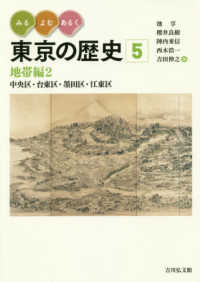- ホーム
- > 洋書
- > 英文書
- > Philosophy
Full Description
Hegel's philosophy is often presented as a reconciliation between thought and the world, and thus logic and metaphysics. But what is the basis of this reconciliation? In this book, Clark Wolf argues that the key to Hegel's transformation of philosophy lies in his recognition of the special logical basis of the humanly made world. Human artifacts and institutions are not merely represented by concepts; concepts are necessary for their very existence. For this reason, Hegel sees the human world, the world of spirit or Geist, as more central in philosophy than the mind-independent world of nature. Hegel's philosophy is thus a humanism. Wolf argues that this humanistic conception of philosophy is justified in Hegel's Science of Logic, since its logical basis is his theory of concepts. Through a detailed interpretation of the Doctrine of the Concept, this book sheds new light on Hegelian idealism.
Contents
1. Introduction; 2. From practical to absolute knowledge: the artifactual model in Hegel's phenomenology; 3. The concept as form of thought; 4. The concept's comprehension of the metaphysics of substance; 5. The constitutive concept: the logical significance of teleology; 6. Living artifacts: the logical basis of Geist; 7. Hegel's inverted idealism: the artifactual paradigm in Hegel's Realphilosophie; Bibliography; Index.








